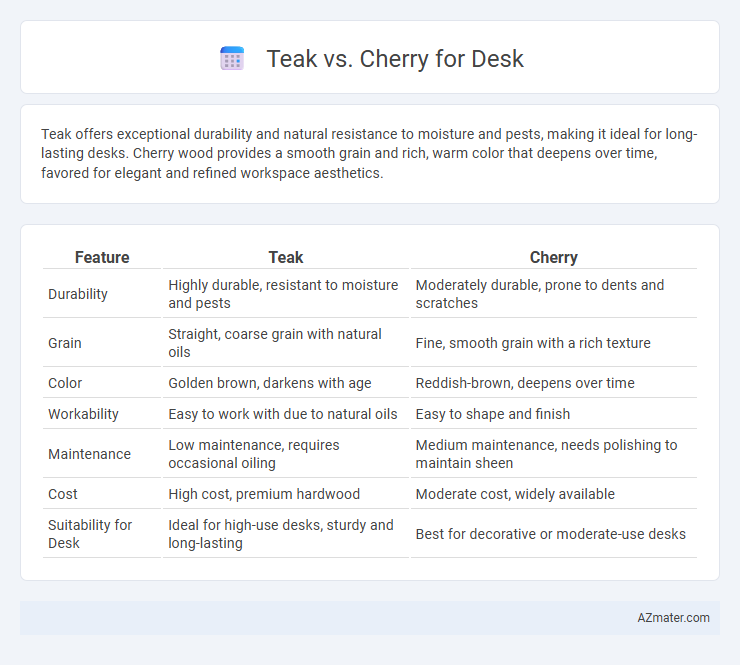Teak offers exceptional durability and natural resistance to moisture and pests, making it ideal for long-lasting desks. Cherry wood provides a smooth grain and rich, warm color that deepens over time, favored for elegant and refined workspace aesthetics.
Table of Comparison
| Feature | Teak | Cherry |
|---|---|---|
| Durability | Highly durable, resistant to moisture and pests | Moderately durable, prone to dents and scratches |
| Grain | Straight, coarse grain with natural oils | Fine, smooth grain with a rich texture |
| Color | Golden brown, darkens with age | Reddish-brown, deepens over time |
| Workability | Easy to work with due to natural oils | Easy to shape and finish |
| Maintenance | Low maintenance, requires occasional oiling | Medium maintenance, needs polishing to maintain sheen |
| Cost | High cost, premium hardwood | Moderate cost, widely available |
| Suitability for Desk | Ideal for high-use desks, sturdy and long-lasting | Best for decorative or moderate-use desks |
Introduction to Teak and Cherry Wood
Teak wood is highly valued for its durability, natural oils, and resistance to moisture, making it an excellent choice for desks exposed to humidity or frequent use. Cherry wood, known for its rich, reddish-brown hues and smooth grain, offers a warm, elegant appearance that deepens with age, ideal for refined indoor furniture. Both woods provide unique aesthetic and functional qualities, with teak excelling in strength and weather resistance, while cherry emphasizes beauty and a distinctive patina.
Appearance and Grain Differences
Teak wood showcases a rich golden to medium brown color with straight grain patterns that often feature natural oily luster and occasional darker streaks, giving desks a warm and tropical aesthetic. Cherry wood displays a fine, straight to wavy grain with a smooth texture that deepens from light pinkish-brown to deep reddish-brown over time, enhancing the desk's classic and elegant appearance. The contrasting grain clarity between teak's coarse, oily texture and cherry's fine, smooth finish significantly influences the visual appeal and character of the desk surfaces.
Durability and Lifespan
Teak wood is highly valued for its exceptional durability and natural resistance to moisture, insects, and decay, making it an ideal choice for long-lasting desks in various environments. Cherry wood offers a moderate level of durability with a smooth grain that becomes richer in color over time, but it is more susceptible to dents and scratches compared to teak. Desks made from teak typically outlast cherry by several decades due to teak's dense oil content, which enhances its lifespan even in challenging conditions.
Maintenance and Care Requirements
Teak desk surfaces require minimal maintenance due to natural oils that resist moisture and pests, needing only occasional cleaning with a damp cloth and periodic oiling to retain their rich color. Cherry wood desks demand more attentive care, including regular dusting and protection from direct sunlight to prevent darkening and warping, along with conditioning to maintain the wood's smooth texture. Opting for teak reduces long-term upkeep challenges, while cherry offers a warm aesthetic in exchange for increased maintenance efforts.
Cost Comparison
Teak desks generally come with a higher price tag due to the wood's durability, natural oils, and resistance to moisture, often costing between $800 and $2,500 depending on craftsmanship and size. Cherry wood desks are typically more affordable, ranging from $500 to $1,500, offering a rich, warm tone that darkens beautifully with age but requires more maintenance to prevent scratches. Choosing between teak and cherry for a desk involves weighing initial investment against longevity and upkeep costs, as teak's resilience can reduce long-term expenses despite its upfront premium.
Environmental Impact and Sustainability
Teak is renowned for its durability and natural resistance to decay, often sourced from sustainably managed plantations that help reduce deforestation. Cherry wood, harvested primarily from hardwood forests, has a slower growth rate, making sustainable forestry practices crucial to prevent ecological damage. Choosing teak from certified responsibly managed forests generally offers a more environmentally friendly option compared to cherry, given its faster growth and higher yield per hectare.
Workability and Customization
Teak wood offers excellent workability due to its natural oils, which make it resistant to warping and easy to carve, ideal for custom desk designs requiring durability. Cherry wood, prized for its smooth grain and uniform texture, allows for precise detailing and sanding, resulting in a polished finish that enhances customization options. Both woods respond well to stains and finishes, but cherry's ability to darken over time adds unique character to bespoke desks.
Weight and Structural Strength
Teak wood is denser and heavier than cherry, providing superior weight-bearing capacity and durability for desks designed to support heavy equipment or frequent use. Cherry offers moderate strength with a lighter weight, making it suitable for desks where ease of mobility and aesthetic appeal are priorities. Both woods have excellent structural integrity, but teak's natural oils and tight grain structure give it enhanced resistance to warping and physical stress compared to cherry.
Best Applications for Each Wood
Teak wood is ideal for desk surfaces exposed to moisture or outdoor conditions due to its natural oil content and durability, making it perfect for writing desks or workstations in humid environments. Cherry wood offers a smooth texture and rich, warm tones that enhance indoor furniture aesthetics, making it best suited for executive desks and traditional office settings. Both woods provide sturdy construction, but teak excels in weather resistance while cherry is preferred for its elegant aging and fine grain.
Conclusion: Which is Better for Your Desk?
Teak offers superior durability and moisture resistance, making it ideal for desks in humid environments or heavy daily use. Cherry wood provides a rich, warm aesthetic and develops a unique patina over time, perfect for those prioritizing elegance and character. Choosing between teak and cherry depends on whether long-lasting resilience or evolving beauty matters more for your desk.

Infographic: Teak vs Cherry for Desk
 azmater.com
azmater.com